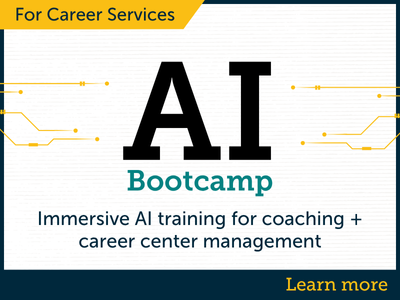Spotlight for Career Services Professionals
Spotlight for Recruiting Professionals
As part of its revision of the NACE Career Readiness Competencies, the Career Readiness Competencies Task Force has identified key behaviors that allow college students preparing to enter the workforce to demonstrate their career readiness to prospective employers.
“The sample behaviors take it up a notch,” explains Stephanie Pallante, early careers recruitment leader at CIGNA Corporation and co-chair of NACE’s Career Readiness Competencies Task Force.
“The competency itself is the knowledge of and aptitude for, but by adding in the behaviors, we now have a more practical, action-based framework.”
Adds Tim Harding, associate dean of career development and engagement at The University of Tampa and co-chair of NACE’s Career Readiness Competencies Task Force: “The sample behaviors elevate the career readiness competencies beyond aspiration by identifying evidence-based practical behaviors that provide a basis for competency assessment. They also clarify the meaning and intent of each competency in a career-related context.”
This is important because the competencies align with the attributes employers most want to see in the college graduates they hire for full-time positions and the college students they bring on board for internships.
Recent NACE research shows that employers are seeking to hire candidates with an ability to work in a team, and with strong problem-solving, analytical, and communication skills.
The task force has tied these sample behaviors—which have been validated through research undertaken in partnership with industry leader SkillSurvey—to the career readiness competencies, which are a set of skills and attributes college students can develop to help launch successful professional careers. Furthermore, colleges and employers can use these behaviors to identify and develop career readiness competencies in college students.
Pallante says there are practical applications for URR professionals to use the revised NACE Career Readiness Competencies in their recruiting and professional development efforts.
“Whether your organization already uses a competency framework or not, the NACE Career Readiness Competencies can be incorporated into your holistic talent strategy in a number of ways,” she says.
“Some quick wins for URR professionals would be to use the revised competencies in your job descriptions to attract a broader, more diverse pool of talent; in your behavioral based interviewing to improve hiring decisions; and in intern programming to improve upon key skill development.”
Meanwhile, Harding explains that the competencies can be used in career services and across campus to boost students’ development and help them make a successful transition to the workforce.
“Competencies used in the context of student success, which includes career readiness, helps to bring meaning to learning and provides a framework through which students may consider their entire curricular and co-curricular collegiate experience through a focused developmental lens that culminates in a positive transition to the world of work,” he says.
“Colleges that successfully infuse the competencies throughout the institution will likely see greater student awareness, development, and articulation resulting in a higher level of career readiness.”
More information about NACE’s Career Readiness Competencies—including the sample behaviors—is available on NACEWeb.
NACE’s Career Readiness Competencies and their definitions are:
- Career & Self-Development—Proactively develop oneself and one’s career through continual personal and professional learning, awareness of one’s strengths and weaknesses, navigation of career opportunities, and networking to build relationships within and without one’s organization.
- Communication—Clearly and effectively exchange information, ideas, facts, and perspectives with persons inside and outside of an organization.
- Critical Thinking—Identify and respond to needs based upon an understanding of situational context and logical analysis of relevant information.
- Equity & Inclusion—Demonstrate the awareness, attitude, knowledge, and skills required to equitably engage and include people from different local and global cultures. Engage in anti-racist practices that actively challenge the systems, structures, and policies of racism.
- Leadership—Recognize and capitalize on personal and team strengths to achieve organizational goals.
- Professionalism—Knowing work environments differ greatly, understand and demonstrate effective work habits, and act in the interest of the larger community and workplace.
- Teamwork—Build and maintain collaborative relationships to work effectively toward common goals, while appreciating diverse viewpoints and shared responsibilities.
- Technology—Understand and leverage technologies ethically to enhance efficiencies, complete tasks, and accomplish goals.






